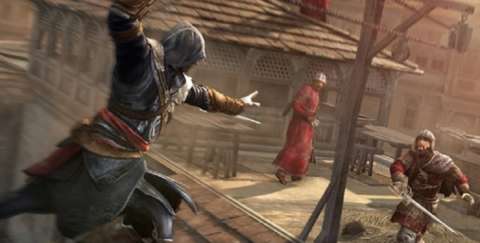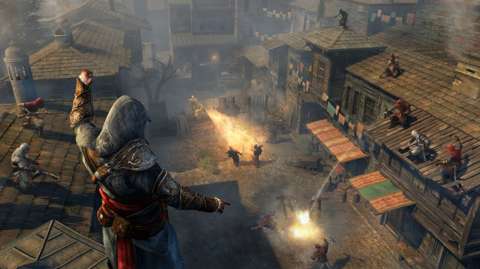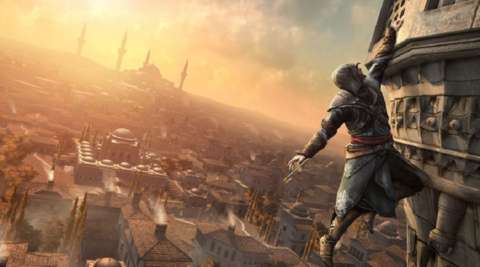Ubisoft’s sci-fi/historical fiction mashup series Assassin’s Creed has already made its mark as one of the biggest and most important new IP’s of this generation, so it’s not surprising that Ubisoft is pushing these games out so frequently these days. Three characters and four console games in, Assassin’s Creed: Revelations marks the final chapter in the story of Ezio Auditore, but also the next motion of Ubisoft toward annual releases of the Assassin’s Creed series. It’s unsettling seeing the series become so common on store shelves, but don’t worry: Revelations is a surprisingly expansive game that doesn’t make any earth-shattering changes, but hones its narrative and design into sharpened tools that are hard to put down.
Assassin’s Creed: Revelations continues the story of Desmond Miles and his genetic ancestor Ezio Auditore da Firenze. Ezio’s journey since his debut in Assassin’s Creed II has led him to Constantinople to search for the hidden keys to the library of his (and Desmond’s) ancestor Altaïr Ibn-La'Ahad. Ezio encounters a rebellious young assassin named Yusuf Tazim and a scholarly woman named Sofia Sartor to help him with his goals of taking out the Templar control of the city and reclaiming the keys to Altaïr’s library. Meanwhile, Desmond is locked in a coma and is trapped inside the Animus’ digital world. He meets the genetic remnant of a former Animus user, Subject 16, who cryptically teases Desmond and provides clues to getting Desmond out of his coma. Desmond’s background is brought out more through memory sequences that detail his buried history of his assassin heritage, which is a nice touch, but like the last two console games in the series, Ezio is the star. Ezio, now in his 50’s, is a strong-willed, but emotionally tired man. He’s seen many things throughout his life, so he’s more a wise tactician than a brash street brawler; it’s a fantastic progression of his character. The story also detours occasionally to the time of Altaïr (who is a big part of the overarching story this time around). While his role in the original Assassin’s Creed was shallow and uninteresting, Revelations shows Altaïr in a much stronger light. These flashbacks show important events of Altaïr’s life that occur after the events of the first game, so it’s very good seeing his character rise above his rather poor presentation in the very first game in the series. Overall, these three characters’ histories become richly intertwined as the game progresses, adding a deep narrative with a much more appealing structure than Brotherhood had.

The core gameplay of Assassin’s Creed remains unchanged: you still free-run across rooftops, perform flashy combat against enemies, collect hidden items and use stealth to assassinate targets. The introduction of the Hookblade gives Ezio a faster and more fluid traversal and some new combat maneuvers, but the free-running is still essentially the same. Combat is practically identical to Brotherhood and the available items aren’t anything revolutionary. Unfortunately, Revelations still has some frustrating moments where the free-running controls lead to falling from rooftops or simply jumping the wrong way. While these moments are annoying, the free-roaming gameplay is still some of the best in the open-world genre and performing death-defying acrobatics like the now-iconic Leap of Faith is a recurring joy for the series.
There are some changes to the series that Revelations tries to bring out into view. A major nuance is bomb crafting. Ezio can use crafting tables and ingredients to make bombs, which can be used in a number of ways, like smokescreens, poison gas or simple explosions. Different ingredients offer different effects, so there are lots of combinations that can yield better or worse results for certain stealth or combat situations. The problem lies in how bombs are implemented into the rest of the game; they simply aren’t too useful. There will be times when you’ll forget you even have bombs, showing how unessential they are to the missions. If you want to experiment with them to change up the dynamic of gameplay, that’s fine, but they simply don’t feel important enough to be worth your reliance on them.
The other major addition is the Assassin Den defense. Similar to the Borgia Towers of Brotherhood, Assassin Dens are Ezio’s way of exerting Assassin control of Constantinople. Capturing a den offers improved security and control of the city, but by gaining notoriety, Ezio’s actions can lead to Templars attacking the den. This brings up a tower-defense scenario where Ezio must direct forces to defend the den or lose control of it to the Templars. This sequence is generally interesting, but can be completely avoided by simply not gaining notoriety. It’s possible to complete the entire story and only perform a defense once (the required tutorial defense). It’s a shoehorned mode that doesn’t feel essential at all, especially since it’s so easy to ignore in the game.

The returning features of buying out stores for earning cash and influence, finding hidden treasure and training your assassin recruits throughout the continent are still as addictive and fun as ever. They appear frequently and getting them all is a real challenge, especially if you’re after Full Synchronization. Assassin’s Creed: Brotherhood was a game chock full of side missions and Revelations continues the series’ tradition of bombarding you with distractions. The side missions are interesting, varied and plenty fun to play in between the surprisingly deep and complex story missions. Completing them all isn’t just a long-term goal; it’s one that’s actually worth working toward.
The multiplayer introduced in Brotherhood returns in Revelations, but it’s not as interesting or refined as it was in the last installment. The introduction of new modes and abilities is appreciated, but the concept of stunning and assassinating is still far too dependent on leveling, so you can frequently be outdone by someone who simply has better tools to use instead of cunning and clever skill. It’s a decent mode with the same “cat and mouse” gameplay, but the few improvements don’t do much to remedy the already established flaws found in Brotherhood or the recurring leveling problems.
By collecting scattered Memory Fragments as Ezio, the player can unlock special genetic memories of Desmond. These sequences are played in a first-person perspective, where Desmond must manifest platforms to progress to the buried subconscious. These are mildly clever puzzle sequences in the vein of Portal, but they feel a bit unrefined in their construction. Platforms can be used unlimited times and the puzzles themselves aren’t too challenging to finish. Throughout these puzzles, you get narration from Desmond about his family and his assassin training, so it’s cool to get some context for Desmond himself, a character who up until now has merely been a conduit for the more interesting roles of Altaïr and Ezio. However, they aren’t necessary and only serve as minor distractions between Ezio’s missions.
The graphical shine of Assassin’s Creed: Revelations isn’t as pristine as it was in Assassin’s Creed II, but the tower-top vistas of Constantinople are impressive enough to compete with those seen in Brotherhood. There aren’t as many signature landmarks like in Brotherhood’s Rome, but the city’s rugged and more creative West Asian architecture allows it to hold a good amount of personality. The tech can bring up some unrefined textures and some animation glitches, however, but it’s still incredible seeing how creatively presented this series can get this far down the road. Voice acting has been another series high, with Roger Craig Smith bringing even more personality to Ezio’s newer, almost sage-like persona. One shining role is Cas Anvar as Altaïr, who gives new life to a character who was so condemned early in the series. Anvar’s Altaïr, like Smith’s Ezio, evolves throughout the game, undergoing multiple moods throughout different points in his life. It’s a fresh perspective that makes you feel like you’re being introduced to a new character entirely.

Despite the unneeded introductions of completely auxiliary bomb crafting and tower defense, Assassin’s Creed: Revelations manages to keep its trademark gameplay fresh with great mission variety and lots of content. It’s easy to lose yourself in Constantinople’s massive array of side challenges, but the story missions keep the interesting factors of the gameplay at full alert. The biggest strength is the steadily woven stories of Ezio, Altaïr and Desmond, all of which bring new life into some characters that were starting to feel dry this far down the line. Even with the sub-par multiplayer offerings and a lack of groundbreaking new inclusions to the gameplay, Revelations shows how well-maintained this series’ core elements are. While Ezio’s journey has come to an end, Revelations captures everything that we loved about Assassin’s Creed II and Brotherhood, all while expanding the story in meaningful and captivating ways.

